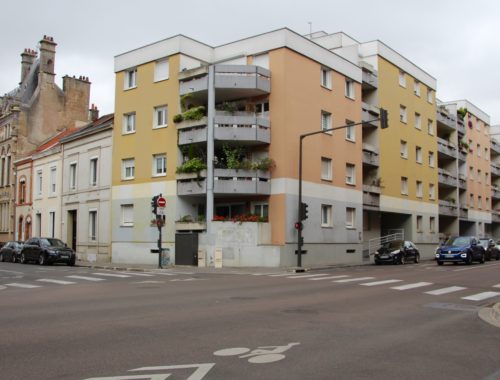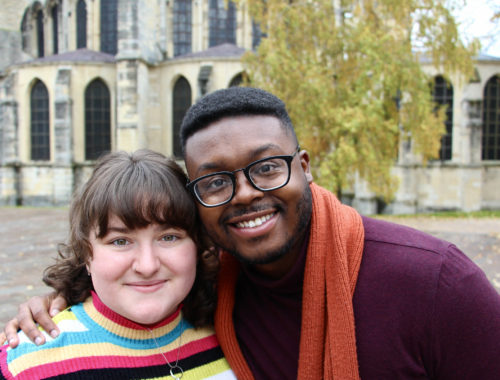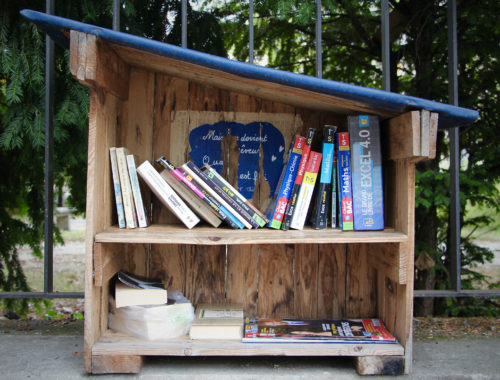
How to Study in France as A Couple and What it’s Really Like
Jalen and I do most things together. We both studied French and International Affairs at the University of Mary Washington, participated in the Teaching Assistant Program in France (TAPIF) simultaneously, and now we’re pursuing degrees together at the Université de Reims Champagne-Ardenne. Navigating a move abroad as a couple isn’t always easy, but for us it has absolutely been worth it! Read on to learn how we came to France to study as a couple of international students.
Is it possible to study in France as a couple?
The short answer is yes! However, just as TAPIF isn’t really made for couples, the process of applying for and pursuing a degree in the French higher education system was definitely devised for single students. Here’s how we went about it as two Americans pursuing master’s degrees in French institutions.
The first step for Jalen and I was choosing our desired fields of study. While we both studied the same subjects during our undergraduate degrees, we took totally different paths for graduate school. Jalen decided to target international business and logistics programs while I aimed for public law and international relations programs.
Because we definitely wanted to study in the same city so that we could continue to live together, we had to do a lot of research, both individually and jointly. After separately combing through hundreds of university programs with the help of Campus France’s master’s degree catalogue and the Trouver mon Master portal, we each came up with a list of programs that interested us.
Next, we compared our lists to find which universities we had in common. Depending on your fields of study, finding a university that offers programs that interest both individuals will be more or less difficult. Luckily, Jalen and I were able to identify several schools that catered to both of our academic interests, which allowed us the opportunity to apply to some of our top-choice programs.
Finally, we each applied separately to the maximum seven programs that the Études en France application allowed and waited to hear back from the universities. I was ultimately accepted to five programs and Jalen was accepted to two. Luckily, both of the universities that accepted Jalen also accepted me, meaning that we had a choice between the Université de Lille and the Université de Reims Champagne-Ardenne, both of which offered some of our favorite programs! After weighing the pros and cons of both schools, we decided that the Université de Reims Champagne-Ardenne was the best choice for both of us.
It’s important to keep in mind that all of the administrative processes necessary for pursuing a degree in France must be completed separately. Everything from our university applications to our visa applications to the Inscription Administrative (enrollment) to the Inscription Pédagogique (course registration) were individual affairs. Unlike with TAPIF, there is no point in the process where a couple can indicate their relationship to each other.
It should be pointed out that both individuals making up a couple attempting to study in France must have genuine, independent motivations. For example, during my Campus France phone interview, my own motivations were brought into question by my interviewer. I had to explain why Jalen and I had chosen to apply to the same schools and clarify that we would be pursuing completely different career paths. French universities, Campus France, and the French government require that international students demonstrate sincere and individual interest in studying in France. Therefore, simply applying to universities to follow a significant other to France will likely not work out in your favor.
In short, though the process is not made for couples, studying in France together is absolutely an option!
What is it like to study in France as a couple?
In our opinion, it’s an amazing opportunity that we would recommend to others. Jalen and I have experienced numerous advantages related to studying as a couple during the first year of our master’s degrees.
First and foremost, having the support of a significant other while tackling an advanced degree in your second language is priceless. Because you are both having similar experiences, your partner understands exactly what you’re going through. This means you’ll both have a built-in cheerleader, shoulder to cry on, and helping hand whenever you’re in need.
Another benefit to studying as a couple is the ability to split the bills! We love being able to split grocery expenses, wifi fees, rent, and more without having to live in student housing or find roommates. Like most students around the world, we have a small budget, and sharing our costs makes our money go even further.
Lastly, though Jalen studies Logistics and I study Public Law, we are still able to support each other academically. For example, it’s always helpful to practice an oral presentation in advance or to explain a concept aloud to check your own understanding. Your partner can serve as a listener and a critic in these situations, pushing you to do the best that you can in a supportive environment.
Our experience studying in France as a couple has been an overwhelmingly positive one. Though it’s not necessarily a common path to take, we have enjoyed taking on the challenges and celebrating our triumphs together. Are you considering moving to France with your significant other? Tell us your story in a comment below!
Check out our video to find out more about our relationship!
Check out our Q&A to learn more about us!
You May Also Like

Applying for a Master’s Degree in France: How to Complete the Online Application
October 7, 2020
Studying in France as Americans: Hectic and Entertaining Student Life
December 8, 2021

